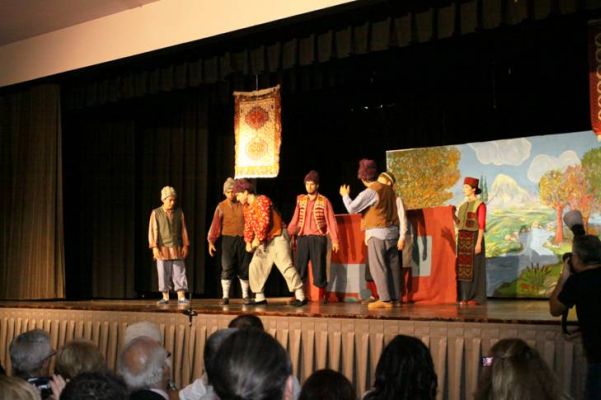October 28, 2013
AGBU Toronto Press Release
930 Progress Avenu
Scarborough, Ontario
M1G 3T5
Tel: 416-431-2428
Email:agbutoronto@bellnet.ca
Website:www.agbutoronto.org
October 28, 2013
An Evening of Comedy: Tales of Hovhanness Toumanian a Big Hit
On the evening of September 29th, the Armenian General Benevolent Union and the Armenian Association of Toronto presented An Evening of Comedy: Tales of Hovhanness Toumanian, seven well-acted vignettes based on some of the works of the beloved Armenian writer Hovannes Toumanian. The Babayan Hall of the AGBU Alex Manoogian Cultural Centre was packed with people of all ages. Some had come because they were devotees of Toumanian, others had come to laugh and still others had come to be with friends. Children of all ages were there as well. The production provided something for everyone but perhaps most important of all, it introduced a giant of Armenian literature to a segment of the audience that maybe had never had a chance to know him.
Toumanian’s stories, poems, and fables are alive and imbued with the people, the traditions and the majestic mountainous landscape of the villages of his native Lori. His works have touched, enchanted, entertained and enlightened readers since the beginning of the 20th century. Those were turbulent and difficult times for Armenians and Toumanian was a witness to the horrors. The suffering of his people pained him profoundly. Armenian schools, newspapers and cultural institutions were shut down in the Caucasus and Toumanian was incensed that the “powers to be” had manipulated simple honest folk to fight against each other. In fact, in those days, Toumanian carrying a white flag rode on a horse from town to town in Lori to negotiate peace amongst the villagers. The massacres of Adana, followed by violent confrontations amongst neighbours in the Caucasus and the Armenian Genocide of 1915 propelled him to become an activist for peace and justice and use his art for that noble cause without being didactic.
The director of Tales of Hovhanness Toumanian, Varazh Stepanian, without being didactic as well, has been able to convey the gist of the message found in Toumanian‘s oeuvres. And using simple props, updated techniques and stage directions, he also provided maximum entertainment value for his audience. Stepanian encouraged the engagement of the audience into his production from the beginning when he asked them to join the characters in the play whenever they heard one of them sing na, na, na, na, na. The children sitting in front of me in the audience, with their adult counterparts, would chime in en masse with the refrain whenever they heard it on stage. The singing engaged the audience and brought them into the play. They were no longer outsiders looking in but part of the work. I think Toumanian would have liked that.
Stepanian heightened and punctuated the comic element in his production with witty anachronistic touches. In The Simpleton, a poor peasant seeks the help of God. He finds God sitting in front of a computer presumably overseeing the running of the Universe. When the simple peasant appears before Him, God wants to know what language he speaks; of course the reply is Armenian. God asks: Eastern or Western Armenian? The peasant replies: Eastern Armenian. God asks him to specify: Eastern Armenian of Armenia or Eastern Armenian of Persia. The audience responded with uproarious laughter to this interchange for obvious reasons. However, separations can cause the development of misunderstandings.
Toumanian sought the triumph of unity, justice and peace for humankind and the end of bloodshed. These humanitarian ideals are the leitmotif in most of his works, poignantly expressed in one of his greatest poems, A Drop of Honey, which he wrote whilst imprisoned in Tiflis. A drop of honey that falls on the floor of a village shop gives rise to a misunderstanding, becomes the cause of conflict between two people, grows into a conflict between two villages and then war between countries. Stepanian in dramatizing this poem as simply as possible on the stage brings to the fore the folly and stupidity of the actions of the characters and the satire inherent in the work as Toumanian wrote it.
Mr. Stepanian, the actors and crew are to be congratulated for adapting to the stage in such an entertaining manner some of Toumanian’s works; surely not an easy task. The problems that distressed Toumanian in the early part of the 20th century and that he so movingly wrote about are still with us today. Stepanian underlined the ridiculous manner with which Toumanian’s characters approached their problems and made us laugh. When we stopped laughing, Mr. Stepanian made us realize the relevance of Toumanian’s writings for today‘s readers and the universality of his message.
isa basmajian

